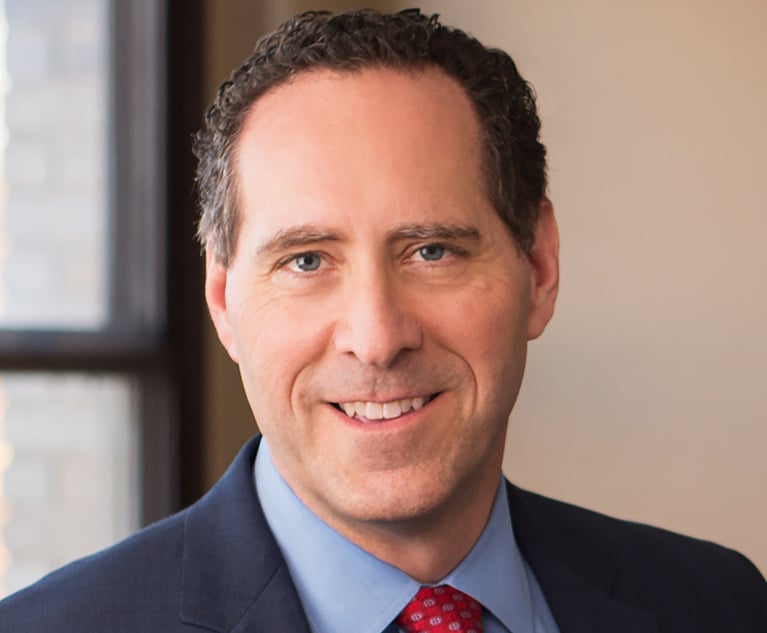Pa. High Court Issues New Discipline Rule Against 'Bias or Prejudice' in the Practice of Law
Adoption of the new rule was quickly praised by legal community leaders, including Pennsylvania Bar Association president David Schwager.
June 11, 2020 at 06:37 PM
5 minute read
 Photo: everything possible/Shutterstock.com
Photo: everything possible/Shutterstock.com
What began in the wake of the #MeToo movement has ended with a new disciplinary rule aimed at punishing bias and discriminatory behavior by lawyers, just as protests over police brutality and the legacies of racism have erupted across the country.
On Monday, the Pennsylvania Supreme Court adopted a new disciplinary rule saying attorneys can face discipline if, during the practice of law, they "knowingly manifest bias or prejudice, or engage in harassment or discrimination, as those terms are defined in applicable federal, state or local statutes or ordinances."
The rule specifically targets discrimination or harassment based on race, sex, gender identity or expression, religion, national origin, ethnicity, disability, age, sexual orientation, marital status or socioeconomic status. A comment to the rule says the new regulation means lawyers could face discipline if the problematic conduct occurs during "continuing legal education seminars, bench bar conferences and bar association activities where legal education credits are offered."
Justice Sallie Updyke Mundy dissented from the rule, although no dissenting opinion accompanied the order. Those who spoke with The Legal said it is unusual to see a dissent to a disciplinary rule.
Adoption of the new rule was quickly praised by legal community leaders, including Pennsylvania Bar Association president David Schwager.
"We thank that Supreme Court for approving this much-needed rule that is consistent with the PBA's longstanding policies," he said in a statement issued Tuesday.
Several disciplinary attorneys lauded the move as well, saying it brings the disciplinary rules more in line with current social norms.
"It's very important that the Supreme Court promulgated this rule," Philadelphia attorney Ellen Brotman said. "It was the right thing for the profession, and it was the right time to do it."
However, the new rule, which is based on a model rule the American Bar Association adopted in 2016, has not been without controversy.
According to Cozen O'Connor attorney Thomas Wilkinson, who was involved in developing the rule both at the American Bar Association and the Pennsylvania Bar Association level, efforts to adopt specific anti-bias and discrimination rules arose in the wake of the #MeToo movement, but the efforts received significant pushback, largely based on First Amendment and religious concerns, with the Federalist Society and the Christian Legal Society voicing opposition.
Wilkinson noted that the Pennsylvania rule has been tailored to address some of those concerns, but, in seeking to have the rule adopted in Pennsylvania, letters from these national groups circulated in the state as well, raising the same concerns.
"There were a lot of efforts to ensure that various segments of the bar understood that this was important both symbolically and important for the disciplinary authorities to have an avenue for redress for overt harassment and discrimination," Wilkinson said, adding that the final language proposed, and ultimately adopted, by the high court "had wide support with both the PBA, the major metro bar associations and the [Pennsylvania] Interbranch Commission [on Gender, Racial and Ethnic Fairness]."
Fox Rothschild attorney Abraham Reich, who focuses on disciplinary issues, said he did not believe the rule was any more restrictive of First Amendment rights than any other rule limiting lawyers' speech.
"It's a good thing on balance. I'm comforted by it being in the rules, and people should not be alarmed by it any more than [the rules governing] conflict of interest, or confidentiality," he said. "Practicing law is a privilege, not a right, and we're granted that privilege by the Supreme Court subject to the disciplinary rules."
Wilkinson said one of the main differences between the ABA model rule and the recently adopted rule in Pennsylvania is the addition of the word "knowingly," which adds a mens rea requirement and makes it so it is not simply a trap for the unwary, but instead tracks with local, state and federal violations of discrimination and harassment laws. Relying on definitions of those existing laws, Wilkinson said, is also a differentiation from the ABA model rule.
"We felt it would be a little more helpful to ground it in standards that one could research," he said.
There are some issues that may need to be hashed out in future litigation, including discrepancies in existing laws, like the fact that Philadelphia bans employment discrimination based on sexual orientation, while the state does not. Disputes are also likely to arise around what exactly counts as the practice of law, with one likely question being whether taking an attorney taking additional CLE classes after obtaining all the necessary hours would count.
But, those who spoke with The Legal said the law seemed to provide clear and needed guidance, putting lawyers on notice that they can be disciplined for discriminatory behavior.
"From the perspective of a lawyer representing lawyers facing discipline, you want to see something that's limited in scope to harmful actions or conduct that undermines the integrity of the law, or poses a risk to the public," Brotman said. "I think it's clear, as those terms are defined in the applicable laws."
This content has been archived. It is available through our partners, LexisNexis® and Bloomberg Law.
To view this content, please continue to their sites.
Not a Lexis Subscriber?
Subscribe Now
Not a Bloomberg Law Subscriber?
Subscribe Now
NOT FOR REPRINT
© 2025 ALM Global, LLC, All Rights Reserved. Request academic re-use from www.copyright.com. All other uses, submit a request to [email protected]. For more information visit Asset & Logo Licensing.
You Might Like
View All
Superior Court Directs Western Pa. Judge to Recuse From Case Over Business Ties to Defendant
3 minute read
Neighboring States Have Either Passed or Proposed Climate Superfund Laws—Is Pennsylvania Next?
7 minute read
Cohen Seglias Leader Discusses Growing From Construction Practice into Full-Service Law Firm
Law Firms Mentioned
Trending Stories
- 1How ‘Bilateral Tapping’ Can Help with Stress and Anxiety
- 2How Law Firms Can Make Business Services a Performance Champion
- 3'Digital Mindset': Hogan Lovells' New Global Managing Partner for Digitalization
- 4Silk Road Founder Ross Ulbricht Has New York Sentence Pardoned by Trump
- 5Settlement Allows Spouses of U.S. Citizens to Reopen Removal Proceedings
Who Got The Work
J. Brugh Lower of Gibbons has entered an appearance for industrial equipment supplier Devco Corporation in a pending trademark infringement lawsuit. The suit, accusing the defendant of selling knock-off Graco products, was filed Dec. 18 in New Jersey District Court by Rivkin Radler on behalf of Graco Inc. and Graco Minnesota. The case, assigned to U.S. District Judge Zahid N. Quraishi, is 3:24-cv-11294, Graco Inc. et al v. Devco Corporation.
Who Got The Work
Rebecca Maller-Stein and Kent A. Yalowitz of Arnold & Porter Kaye Scholer have entered their appearances for Hanaco Venture Capital and its executives, Lior Prosor and David Frankel, in a pending securities lawsuit. The action, filed on Dec. 24 in New York Southern District Court by Zell, Aron & Co. on behalf of Goldeneye Advisors, accuses the defendants of negligently and fraudulently managing the plaintiff's $1 million investment. The case, assigned to U.S. District Judge Vernon S. Broderick, is 1:24-cv-09918, Goldeneye Advisors, LLC v. Hanaco Venture Capital, Ltd. et al.
Who Got The Work
Attorneys from A&O Shearman has stepped in as defense counsel for Toronto-Dominion Bank and other defendants in a pending securities class action. The suit, filed Dec. 11 in New York Southern District Court by Bleichmar Fonti & Auld, accuses the defendants of concealing the bank's 'pervasive' deficiencies in regards to its compliance with the Bank Secrecy Act and the quality of its anti-money laundering controls. The case, assigned to U.S. District Judge Arun Subramanian, is 1:24-cv-09445, Gonzalez v. The Toronto-Dominion Bank et al.
Who Got The Work
Crown Castle International, a Pennsylvania company providing shared communications infrastructure, has turned to Luke D. Wolf of Gordon Rees Scully Mansukhani to fend off a pending breach-of-contract lawsuit. The court action, filed Nov. 25 in Michigan Eastern District Court by Hooper Hathaway PC on behalf of The Town Residences LLC, accuses Crown Castle of failing to transfer approximately $30,000 in utility payments from T-Mobile in breach of a roof-top lease and assignment agreement. The case, assigned to U.S. District Judge Susan K. Declercq, is 2:24-cv-13131, The Town Residences LLC v. T-Mobile US, Inc. et al.
Who Got The Work
Wilfred P. Coronato and Daniel M. Schwartz of McCarter & English have stepped in as defense counsel to Electrolux Home Products Inc. in a pending product liability lawsuit. The court action, filed Nov. 26 in New York Eastern District Court by Poulos Lopiccolo PC and Nagel Rice LLP on behalf of David Stern, alleges that the defendant's refrigerators’ drawers and shelving repeatedly break and fall apart within months after purchase. The case, assigned to U.S. District Judge Joan M. Azrack, is 2:24-cv-08204, Stern v. Electrolux Home Products, Inc.
Featured Firms
Law Offices of Gary Martin Hays & Associates, P.C.
(470) 294-1674
Law Offices of Mark E. Salomone
(857) 444-6468
Smith & Hassler
(713) 739-1250






